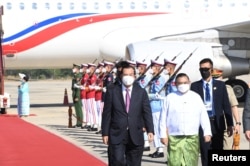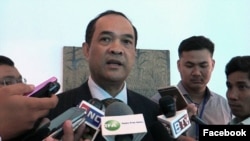Cambodia, the incumbent chair of the Association of Southeast Asian Nations, says the Myanmar Junta’s Foreign Minister Wunna Maung Lwin will not be invited to attend the 10-nation bloc’s top diplomatic gathering in Phnom Penh this month.
“Since there is little progress in the implementation of the 5-Point Consensus, ASEAN member states find it hard to reach a consensus to invite Myanmar SAC's foreign minister to participate in the Retreat,” Cambodian Foreign Ministry Spokesperson Chum Sounry told VOA Khmer on Wednesday, using an acronym of the Myanmar junta’s official name State Administration Council.
“Thus, we have asked Myanmar to send a non-political representative instead,” Chum Sounry said.
The gathering, known officially as the ASEAN Foreign Ministers’ Retreat, is one of the regional grouping’s most prominent annual meetings. It is scheduled to take place in Phnom Penh on February 16-17.
The decision by Phnom Penh not to invite the junta’s foreign minister indicates a reversal by Prime Minister Hun Sen’s government following his engagement in recent months with Myanmar's coup-making generals – which included a visit to Naypyidaw – and after it had met resistance from fellow ASEAN member states, including Indonesia, Malaysia, and Singapore.
Amid disagreement in early January, Cambodia decided to postpone the retreat that originally was set to be held January 18-19 in the northern town of Siem Reap.
Hun Sen said earlier that he wanted to restore the ASEAN-10 instead of the continued ban of the Myanmar junta.
“We encourage Myanmar to be presen[t] at the Retreat at a non-political level rather than leaving the seat empty. It is up to Myanmar to decide who that "non-political level" would be,” Chum Sounry said.
In subsequent calls with his ASEAN counterparts in January, Hun Sen firstly acknowledged the existence of the National Unity Government – Myanmar’s government in exile – and started raising the bar for the Myanmar Junta to show “progress” in implementing the bloc’s five-point consensus to be able to attend ASEAN’s political-level meetings.
Chum Sounry also clarified what can be regarded as “progress” in this context.
“When we talk about progress in the implementation of the 5PC, we wish to see more commitment from Myanmar and others to end violence through a ceasefire agreement, to kick-start a dialogue process that involved all parties concerned and to allow access to political detainees, and to enable and facilitate access of humanitarian assistance to those in need, etc.,” Chum Sounry said.
Cambodian Institute for Cooperation and Peace’s research fellow Vann Bunna said the move shows the limits of Cambodia’s earlier maverick policy to engage Myanmar military regime in the face of opposition from the “more influential” ASEAN member states.
“Cambodia is doing so because it knows that if it continues to push for an inclusion of Myanmar junta’s foreign minister it will not be possible to hold any ASEAN foreign ministers’ meeting,” Vann Bunna said.
Vann Bunna said the Cambodian government seems to have decided at this time that the interests in staying with other ASEAN member states outweighed the efforts to build trust and good relations with the Myanmar junta, which he deemed as unreliable, noting the junta violated the ceasefire it promised with Hun Sen during the latter’s Myanmar trip in early January.
Other main regional actors, including the ASEAN secretariat and Indonesian Embassy in Phnom Penh, have not immediately responded on Wednesday to VOA’s request for comment.
In an interview with VOA Khmer on Wednesday, U.S. Embassy Phnom Penh’s political chief Jonathan Turley renewed U.S. calls for Cambodia to “hold the Burmese military regime accountable.”
"We urge Cambodia as ASEAN chair to continue to press for the implementation of the five-point [consensus] and to ensure that any visit [to Myanmar] by the ASEAN special envoy includes meeting with all partners,” Turley said.
It was one year ago this week that the Myanmar military establishment Tatmadaw’s chief Senior General Min Aung Hlaing overruled the reelection of Aung San Suu Kyi’s National League for Democracy government and launched a coup. Activists have said the post-coup bloodshed and violence has claimed more than 1,500 lives.






